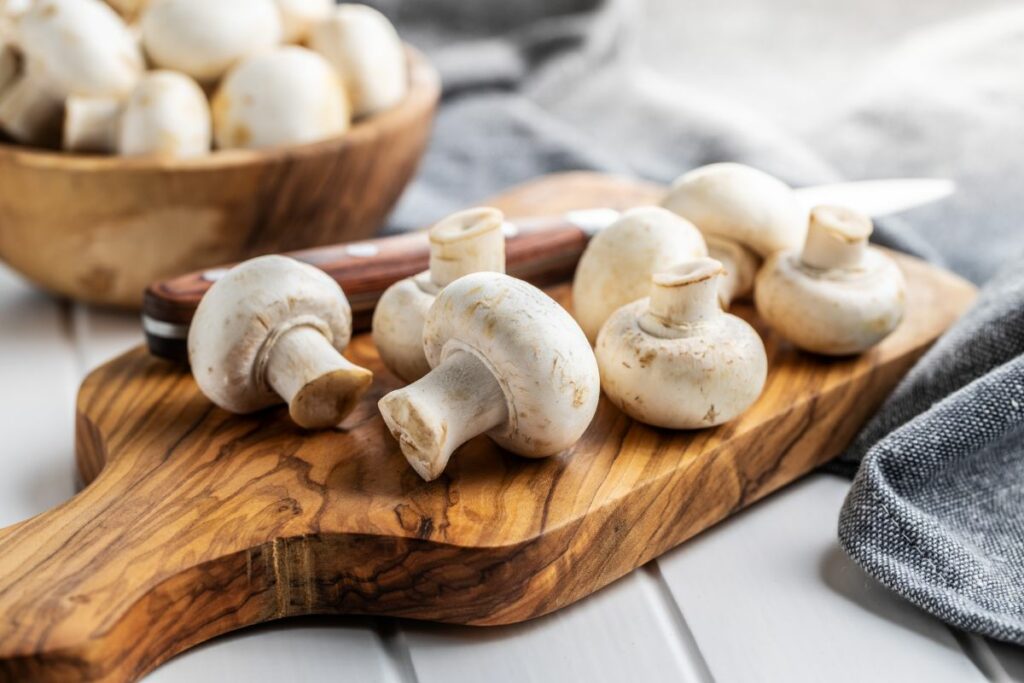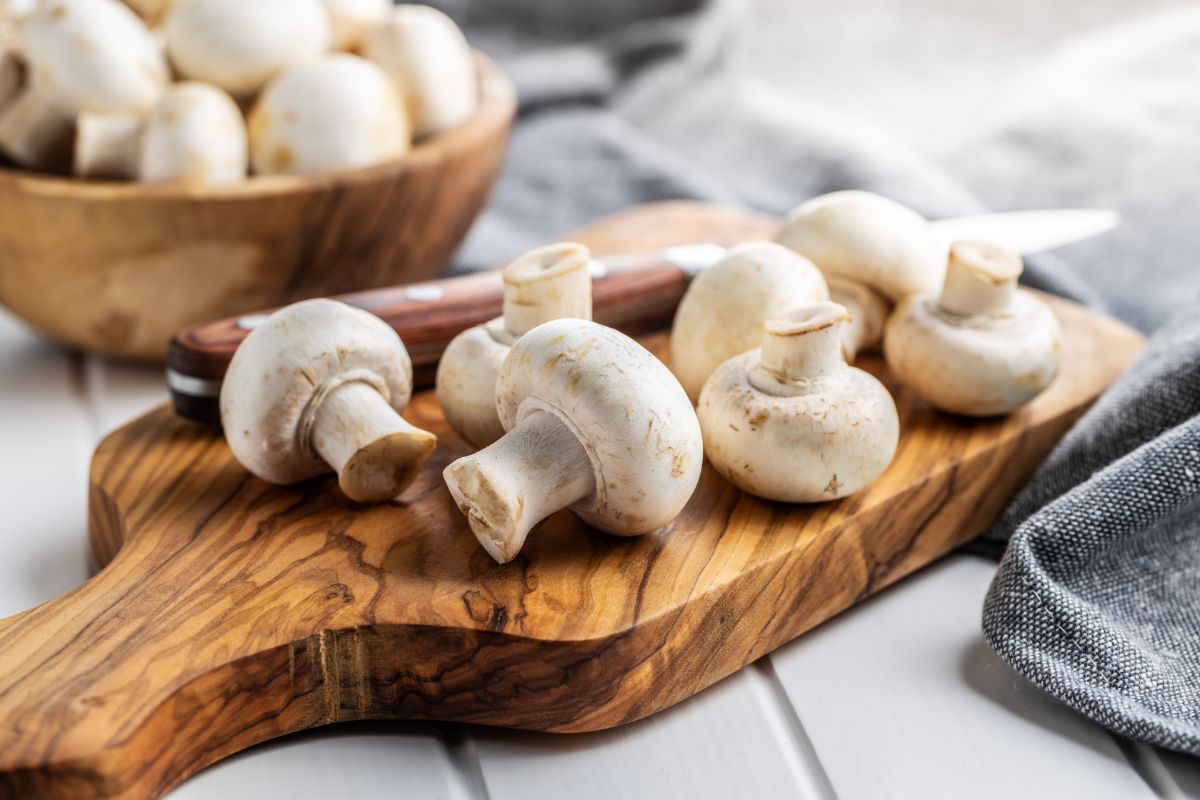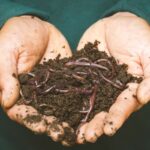Lots of people, including me, compost because it is a great way to recycle and reuse.
You can use many different things in order to compost, but there’s a lot of confusion over what exactly you can compost.
One of the things that confused me when I started composting was whether I could compost mushrooms.

Like me, you might have even seen mushrooms growing out of your composting heap, which may be what has led you here.
So, can you compost mushrooms? Let’s dive headfirst in to find out – I will be going over everything you need to know about the basics of composting mushrooms.
What Is Mushroom Compost?
The term ‘mushroom compost’ should be pretty self-explanatory, but it can be a little bit confusing, especially if you are newer to gardening.
In some cases, it is used as a term to describe compost that is specifically used to grow mushrooms such as button, cremini and portabella mushrooms, but the most common use for the term ‘mushroom compost’ refers to compost that is rich in mycelium.
In other cases, though, it can quite simply mean compost that contains mushrooms, be them wild or the kinds you would buy from the supermarket.
Can You Compost Mushrooms?
Long story short: Yes. You can compost mushrooms.
In most cases, adding mushrooms to your compost heap will actually help in the decomposition process.
They have quite a fast rot time, especially if they are a bit wet.
Most mushrooms are also filled with an incredible amount of nutrients, and when you feed the compost back to your plants, the nutrients from these mushrooms will help them grow stronger and better.
Overall, mushrooms take roughly 3 to 4 weeks to rot down and process in your compost heap, but keep in mind that mushrooms that are drier or bigger might take a bit longer.
Can You Compost Cooked Mushrooms?
If you are wondering if cooked mushrooms can be composted, then the answer to this question is also yes.
Cooked mushrooms can add lots of nutritional value to your compost heap, usually in the form of potassium, copper and phosphorous.
Just like uncooked mushrooms, cooked ones can also help your plants grow bigger and better.
So, if you cook more mushrooms than you can eat and don’t want to waste them, you can add them to your compost heap when you are finished with them.
When it comes to cooked mushrooms, however, it is important to be aware that they invite more pests than uncooked ones.
This is because cooked mushrooms tend to smell as they decompose, and that smell is picked up by the pests who come to feed on them.
It is important to keep an eye on your compost heap if you do add cooked mushrooms to the pile.
Mushroom Compost & Burnt Plants
If you are going to use mushroom compost or compost that contains mushrooms on your plants, it is vital that you be aware that it can cause burns on your plants.
Plant burn is when the colouration of your plants starts to go yellow on the leaves. It is caused by high saturations of salt, which can be caused by mushrooms.
If you are using mushroom compost or mushrooms in your compost heap, it is important to know that this plant burn can happen, but it is not guaranteed.
What you need to do is make sure you aren’t adding too much mushroom compost to your plant soil and keep an eye on the leaves when you do.
Can Mushrooms Grow In Compost?
The mushrooms you add to your compost heap won’t grow, but that doesn’t mean that other species of mushrooms can’t.
Mushrooms, in general, thrive in cooler temperatures and high moisture levels, and they also thrive in decaying wood and leaves.
All of these things are quite normal for compost heaps, and if you also live in an area that is cooler, humid, and rains a lot, this is the perfect environment for wild mushrooms to grow in.
I know I’ve seen my fair share of mushies growing in my own compost heap!
The Dangers of Wild Mushrooms Growing In Your Compost
If you do notice wild mushrooms growing in your compost, it is extremely important to know that there are some dangers that can be associated with them.
Many wild mushrooms are edible or completely harmless, but just as many are not edible and extremely poisonous to humans.
If you are not familiar with different types of mushrooms and you notice them growing in your compost, you should remove them immediately from the heap.
If you are more familiar with different types of mushrooms and have experience, you can check to see if they are poisonous or not.
When it comes to disposing of the mushrooms, make sure to bury them in the centre of your compost heap or safely dispose of them in alternative ways.
If you have any pets or children, make sure to dispose of them somewhere they won’t be able to get at them.
More dangerous mushrooms or non-edible ones that grow in your compost will not mean you have to get rid of the compost altogether; it just means that fungal spores have started to grow.
This should not cause any harm to the plants or the soil you plan on using the compost for.
When it comes to identifying if mushrooms are safe to eat, always make sure that you know exactly what you are talking about or look for a more professional opinion.
If in doubt, however, throw it out!
Final Thoughts
As you can see, you can compost mushrooms.
Whether they are cooked or uncooked mushrooms you buy from the supermarket, all mushrooms can be added to your compost heap.
Mushrooms have nutrients your plants love.
More often than not, they will help enrich your plant soil, but it is important to know that they can cause plant burn if you use too much compost that contains mushrooms.
When it comes to handling mushrooms in any way, it is always important to do your research and know what you are talking about, so please take extra care when it comes to wild mushrooms.
- Can You Grow Bell Peppers Indoors? A Guide For New Gardeners - November 14, 2023
- Composting Basics: Can You Compost Mushrooms? - November 6, 2023
- A Gardener’s Guide To Growing Carrots In Raised Beds - November 1, 2023



